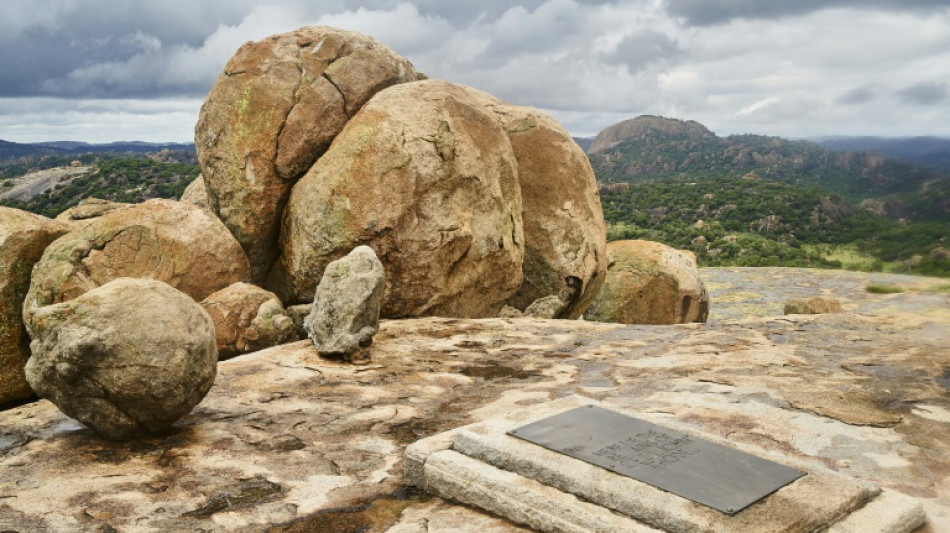
-
 Veteran Monfils exits to standing ovation on Australian Open farewell
Veteran Monfils exits to standing ovation on Australian Open farewell
-
Precision-serving former finalist Rybakina powers on in Melbourne

-
 South Korea's women footballers threaten boycott over conditions
South Korea's women footballers threaten boycott over conditions
-
Equities sink, gold and silver hit records as Greenland fears mount

-
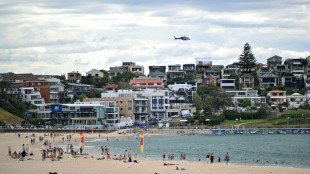 Australian lawmakers back stricter gun, hate crime laws
Australian lawmakers back stricter gun, hate crime laws
-
EU wants to keep Chinese suppliers out of critical infrastructure

-
 AI reshaping the battle over the narrative of Maduro's US capture
AI reshaping the battle over the narrative of Maduro's US capture
-
Penguins bring forward breeding season as Antarctica warms: study

-
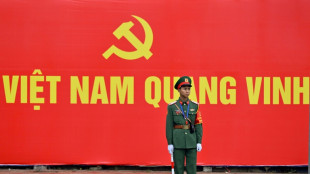 Vietnam leader pledges graft fight as he eyes China-style powers
Vietnam leader pledges graft fight as he eyes China-style powers
-
Ukrainian makes soldier dad's 'dream come true' at Australian Open

-
 'Timid' Keys makes shaky start to Australian Open title defence
'Timid' Keys makes shaky start to Australian Open title defence
-
Indiana crowned college champions to complete fairytale season

-
 South Koreans go cuckoo for 'Dubai-style' cookies
South Koreans go cuckoo for 'Dubai-style' cookies
-
Harris leads Pistons past Celtics in thriller; Thunder bounce back

-
 Tjen first Indonesian to win at Australian Open in 28 years
Tjen first Indonesian to win at Australian Open in 28 years
-
Long-delayed decision due on Chinese mega-embassy in London
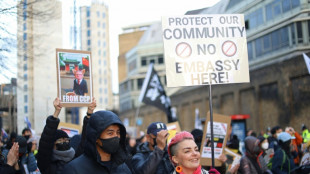
-
 Djokovic jokes that he wants slice of Alcaraz's winnings
Djokovic jokes that he wants slice of Alcaraz's winnings
-
Trump tariff threat 'poison' for Germany's fragile recovery

-
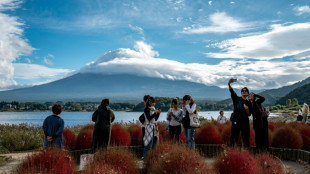 Tourists hit record in Japan, despite plunge from China
Tourists hit record in Japan, despite plunge from China
-
Jittery Keys opens Melbourne defence as Sinner begins hat-trick quest

-
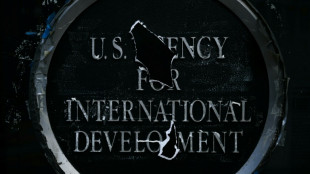 The impact of Trump's foreign aid cuts, one year on
The impact of Trump's foreign aid cuts, one year on
-
Belgian court weighs trial for ex-diplomat over Lumumba killing

-
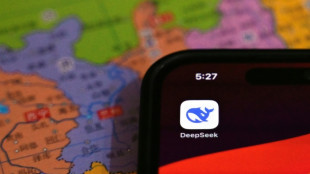 Inside China's buzzing AI scene year after DeepSeek shock
Inside China's buzzing AI scene year after DeepSeek shock
-
Asian markets sink, silver hits record as Greenland fears mount

-
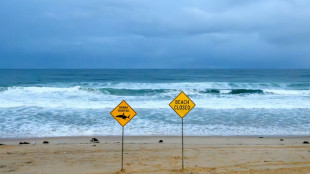 Shark bites surfer in Australian state's fourth attack in 48 hours
Shark bites surfer in Australian state's fourth attack in 48 hours
-
North Korea's Kim sacks vice premier, rails against 'incompetence'
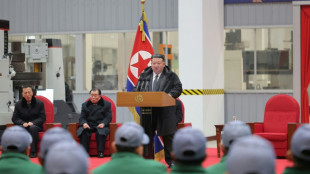
-
 Spain mourns as train crash toll rises to 40
Spain mourns as train crash toll rises to 40
-
'Very nervous' Keys makes shaky start to Australian Open title defence

-
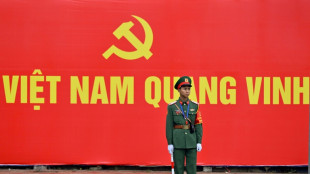 Vietnam leader promises graft fight as he eyes China-style powers
Vietnam leader promises graft fight as he eyes China-style powers
-
Dad-to-be Ruud ready to walk away from Australian Open

-
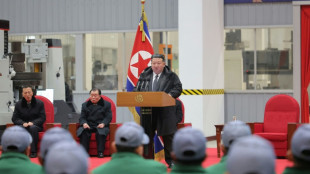 North Korea's Kim sacks senior official, slams 'incompetence'
North Korea's Kim sacks senior official, slams 'incompetence'
-
Farewells, fresh faces at Men's Fashion Week in Paris
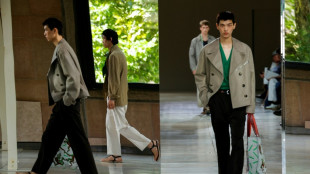
-
 'I do not want to reconcile with my family' says Brooklyn Peltz Beckham
'I do not want to reconcile with my family' says Brooklyn Peltz Beckham
-
EU leaders take stage in Davos as Trump rocks global order

-
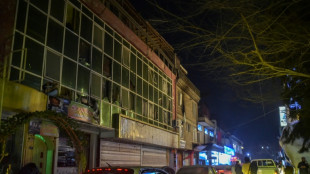 Blast at Chinese restaurant in Kabul kills 7
Blast at Chinese restaurant in Kabul kills 7
-
Warner hits 'Sinners' and 'One Battle' tipped for Oscar nominations
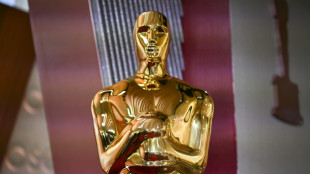
-
 Colombian paramilitary-turned-peace-envoy sentenced over atrocities
Colombian paramilitary-turned-peace-envoy sentenced over atrocities
-
Gilgeous-Alexander leads Thunder in rout of Cavaliers

-
 Seahawks blow as Charbonnet ruled out for rest of season
Seahawks blow as Charbonnet ruled out for rest of season
-
Kostoulas stunner rescues Brighton draw after penalty row

-
 Man Utd greats tell Martinez to 'grow up' as feud rumbles on
Man Utd greats tell Martinez to 'grow up' as feud rumbles on
-
LeBron James' All-Star streak over as starters named

-
 Allies tepid on Trump 'peace board' with $1bn permanent member fee
Allies tepid on Trump 'peace board' with $1bn permanent member fee
-
Ninth policeman dies in Guatemala gang riots, attacks

-
 Man City's Foden to play through pain of broken hand
Man City's Foden to play through pain of broken hand
-
Milan Fashion Week showcases precision in uncertain times

-
 Public media in Europe under unprecedented strain
Public media in Europe under unprecedented strain
-
Africa Cup of Nations refereeing gets a red card

-
 Tributes pour in after death of Italian designer Valentino
Tributes pour in after death of Italian designer Valentino
-
Bills fire coach McDermott after playoff exit: team


British colonialist Cecil Rhodes's grave haunts Zimbabweans
It's a sacred hill where for centuries Zimbabweans would go to consult their ancestors.
It's also where the notorious British coloniser Cecil John Rhodes chose to be his final resting place.
The white supremacist died more than 120 years ago in South Africa aged 48 after carving out swathes of territory for the British empire.
Part of the land grab, later named Rhodesia in his honour, included modern Zambia and Zimbabwe.
Nestled in the Matobo National Park, his grave is simple, with "Here lie the remains of Cecil John Rhodes" engraved on it.
Part of the younger generation wants his remains removed to rid the country of the last vestiges of colonialism.
But the grave attracts tourists who bring much-needed income for surrounding villages -- and many local people oppose any exhumation.
Located atop a steep hill immersed in lush vegetation, a short climb is necessary to reach the grave, which is surrounded by imposing rocks rounded by erosion.
The stones are covered in light green aniseed and orange lichens that brighten at the slightest touch of the sun.
From the hilltop, visitors gaze at the vast expanse of trees around, where antelopes and warthogs roam.
Clouds roll across the tranquil horizon while birds chirp in the silence.
In neighbouring South Africa, students at the University of Cape Town launched a "Rhodes-Must-Fall" protest in 2015, initially to pull down Rhodes's statue at the campus.
It later morphed into a global campaign, which saw Oxford University resisting calls to remove a statue of the politician -- placing an explanatory panel next to it instead.
Often described as a philanthropist but also an arch-racist, Rhodes dreamt of a British Africa from Cape Town to Cairo, with the blessings of Queen Victoria.
Cynthia Marangwanda, 37, from Harare, is enraged by the presence of Rhodes grave.
She believes he chose that site because he knew its spiritual significance to the local people.
It was his "final display of power, a deliberate and calculated act... of domination," said the activist.
Zimbabwe's ex-strongman Robert Mugabe, who took the reins from independence from Britain in 1980, saw no reason to remove Rhodes's remains.
But Marangwanda has been energised by the current president, Emmerson Mnangagwa, who "understands the significance, the heritage aspect of the debate".
Even so, more than five years after Mnangagwa came to power, there is no indication of movement on the issue -- or consensus on where the remains would go.
- 'Pre-eminent shrine' -
The economic benefits accruing from the tourism, do not hold water for Marangwanda.
"Matobo is such a beautiful landscape, it doesn't need this colonial grave," to attract foreign visitors, she stressed.
The presence of the grave in Zimbabwe is an "insult to our very existence as a people," said historian and co-founder of Rhodes-Must-Fall campaign Tafadzwa Gwini, 33.
Exhuming the remains "is a form of reclaiming our identity as a people", insists Gwini.
Yet some visitors simply don't understand the outrage around the grave.
"I brought my kids. I also came here as a kid," said a 45-year-old white Zimbabwean, Nicky Johnson. "History shouldn't be tampered with. He wanted to be buried here, that's how it should be".
Akhil Maugi, 28, who lives from nearby city of Bulawayo, shares similar sentiments.
"You can't erase what happened. No one would come here if this grave was gone," he said.
Pathisa Nyathi, a 71-year-old local historian, points out that it was "the grandeur of the rocks" that made it a "holy site" that once attracted pilgrims from neighbouring countries.
The "pre-eminent shrine" in the region "was sacred to Africans" but not to Rhodes, said Nyathi.
Opposition MP and ex-education minister David Coltart, who regularly cycles in Matobo park, brings some humour to the debate saying "I must say Rhodes had an incredible eye for real estate".
Exiting the park, is a roadside market selling T-shirts, woven baskets and carved animals to tourists.
A little further is a village with a few houses.
Micah Sibanda, 82, stands barefoot, leaning on a walking stick, overlooking a few cows.
Rhodes's grave is "important" to the villagers because it attracts visitors who in turn buy crafts "and we get some money to send our kids to school, ...get food and clothing," said Sibanda.
If the grave is removedwill be very painful for us".
After all, Sibanda said, the white visitors are also coming "to pay respects to their own ancestor."
M.Odermatt--BTB



